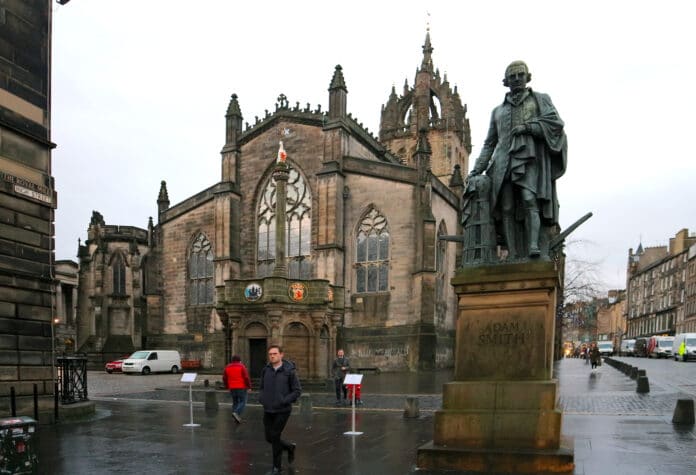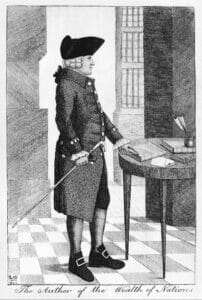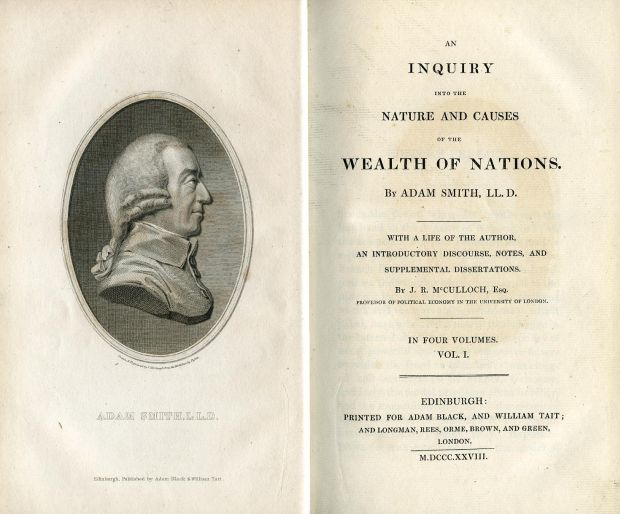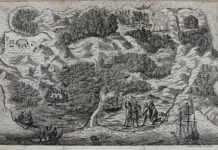
Socialistisk Biblioteks Tidslinje med links til begivenheder og personer i 1723.
Se også Index over personer, organisationer/partier og værker (som bøger, malerier, mm.), steder, begivenheder, mv., der er omtalt på hele Tidslinjen, titler og indhold på emnelisterne osv.
5. juni 1723

Den skotske økonom og moralfilosof Adam Smith fødes i Kirkcaldy. (Dør 17. juli 1790 i Edinburgh).
Anses for den økonomiske liberalismes gudfader og den historiske modsætning til Karl Marx.
Indhold/Contents:
- Biografier etc. (på dansk)
- Litteratur på dansk (+ enkelte artikler)
- Biographies in English etc.
- Articles in English
- Litterature in English
- Se også / See also
****
Det er ikke på grund af slagterens, ølbryggerens eller bagerens godgørenhed, at vi forventer at få mad på bordet, men fordi det er i deres egen interesse. Vi henvender os ikke til deres menneskekærlighed, men til deres selviskhed …
It is not from the benevolence of the butcher, the brewer, or the baker, that we can expect our dinner, but from their regard to their own interest. We address ourselves, not to their humanity but to their self-love …
****
Biografier/biographies etc.:
- Smith, Adam (Leksikon.org)
- Adam Smith (Denstoredanske)
- Adam Smith (Wikipedia.dk)
- Adam Smith var den økonomiske liberalismes fader: men han havde også blik for næstekærligheden. Af Jørgen Steen Nielsen (Information.dk, 14. september 2018). “Selv 225 år efter Adam Smiths død udgør hans ideer kernen i den dominerende økonomiske tænkning og politik. Men liberalisterne har skrevet Smiths sans for det moralske menneske ud af historien.”

Litteratur på dansk:
Adam Smith: Moralfilosof og nationaløkonom. Af Claus Bratt Østergaard (Informations Forlag, 2015, 336 sider). “Bogens hensigt er at sammenfatte de væsentlige pointer, temaer og diskussioner i de to meget forskellige værker, der på hver deres måde (den ene økonomisk, den anden moralsk) samlet set udgør Adam Smiths samfundsfilosofi.”
Teorien om de moralske følelser. Af Adam Smith (Informations Forlag, 2014, 423 sider). “Med Teorien om de moralske følelser præsenteres et vigtigt europæisk hovedværk — der er så godt som ukendt for et dansk publikum.”
Nationernes velstand. Bind 1-2. Af Adam Smith (Informations Forlag, 2013, 441 + 519 sider)
Lær af Adam Smith (Information.dk, 7. juni 2013). Interview med oversætteren Claus Bratt Østergaard.
Kapitalismens dna i ny oversættelse. Af Hans-Jørgen Schanz (Information.dk, 1. juni 2013)
Adam Smith: økonom, filosof, samfundstænker. Af Peter Kurrild-Klitgaard (Jurist- og Økonomforbundet, 2004, 165 sider) (Økonomiens konger). “Ingen dansk bog har nogensinde før forsøgt at fokusere på Smith alene og samtidigt sammenkæde de forskellige dele af hans tænkning. Men her er bogen, der giver det fulde billedet af Smith.”
En undersøgelse af nationernes velstand, dens natur og årsager, I. Af
Adam Smith (Rhodos, 1976, 287 sider) (Rhodos teorihistoriske skrifter). Med indledning af Hans-Jørgen Schanz: Politisk økonomi som samfundsvidenskab (s.7-42). Omslagstitel: Nationernes velstand. Bogen indeholder kun 1. del af originalens 5 dele.
Undersøgelser om National-Velstands Natur og Aarsag af doctor Adam Smith ... Bind 1-2 (Gyldendals Forlag, 1779-1780, 1350 + 775 sider)
Biographies in English:
- Adam Smith (Spartacus Educational)
- Adam Smith (Wikipedia.org)
- Adam Smith, 1723-1790 (The History of Economic Thought Website)
- Adam Smith Reference Archive (Marxists Internet Archive). With biography + two books online: Theory of Moral Sentiments (1759) + Wealth of Nations (1776)
Articles in English:
A man much misunderstood. By Michael Roberts (Weekly Worker, Issue 1450, 6 July 2023). “He helped develop the labour theory of value, he influenced Marx and he never worshipped greed. Despite that he is lauded by the ‘small state’, ‘let the market rule’ right.”
The Other Adam Smith. By Derek Wall (Marx & Philosophy Review of Books, 23 July 2015). Review of Mike Hill and Warren Montag’s book (Stanford University Press, 2015, 397 p.). “Mike Hill and Warren Montag argue, convincingly to my mind, that Adam Smith was a major thinker across a vast range of fields.” See also Mike Hill and Warren Montag: Debating The Other Adam Smith: A response to Christian Thorne’s review (Historical Materialism, 31 May 2919).
Devotees of a dead Scotsman (Weekly Worker, Issue 1059, 21 May 2015). “Was Adam Smith the champion of ‘free market and classical liberal views’? Chis Gray thinks not.”
How the right got Adam Smith wrong on the eve of environmental (and hence economic) catastrophe. By Spencer J. Pack (Logos: A Journal of Modern Society and Culture, Vol.12, No.1, Winter 2013). “It is quite clear that Adam Smith was no libertarian. The right wing narrow interpretations of Smith do not do him justice.”
Adam Smith’s profoundest reader. By Spencer A Leonard (Weekly Worker, Issue 895, December 22, 2011). “The neglect of what is novel in Smith goes hand in hand with the neglect of Marx’s immanent relation to liberalism and to bourgeois revolution itself.”
Adam Smith is closer to Karl Marx than those showering praise on Smith today. By Éric Toussaint (CADTM, 12 June 2009). “In the following citations, we discover that what Adam Smith wrote in the 1770s is not so distant from what Karl Marx and Friedrich Engels would write 70 years later in the famous Communist Manifesto.”
Northern star. By Chris Harman (Socialist Review, No.194, February 1996). Review of Ian Simpson Ross, The Life of Adam Smith (Oxford University Press, 1995). “This book is a useful, but pedestrian, account of his life.”
Education is ignorance. By Noam Chomsky (Chomsky Info). Excerpted from Class Warfare (Common Courage Press, 1996) + Video: Noam Chomsky on Adam Smith & invisible hand (YouTube.com, 4:31 min.). “He’s pre-capitalist, a figure of the Enlightenment. What we would call capitalism he despised.”
Literature in English:
- The Wealth of Nations (Wikipedia.org)
- Introduction to Adam Smith’s The Wealth of Nations
(1887). By E. Belfort Bax (Marxists Internet Archive) - The Theory of Moral Sentiments (Wikipedia.org)
Se også:
- Marx’s critique of classical economics. Chapter 2 in Geoff Pilling: Marx’s Capital, Philosophy and Political Economy (Routledge & Keagan Paul, 1980; online at Marxists Internet Archive)
- The crisis of bourgeois economics. By Chris Harman (International Socialism, No.71, June 1996; online at Marxists Internet Archive)


































![Illustration to Robert Burns' poem Auld Lang Syne by J.M. Wright and Edward Scriven. The Complete Works of Robert Burns: Containing the Poems, Songs, and Correspondence. Illustrated By W.H. Bartlett, T. Allom, and Other Artists. With a New Life of the Poet, and Notices, Critical and Biographical[1] by Allan Cunningham. Published in London by George Virtue. No year is given explicitly, but "James Gibson 1856" has been handwritten inside the front cover, it's dedicated to a MP, Archibald Hastie of Paisley, who was no longer a MP by 1857, and some of the artists and engravers were dead before 1842. As such, I'm going with c. 1841 as the year, though it could be as late as 1856, when James Gibson evidently acquired. From: The Complete Works of Robert Burns: Containing the Poems, Songs, and Correspondence. Illustrated By W.H. Bartlett, T. Allom, and Other Artists. With a New Life of the Poet, and Notices, Critical and Biographical by Allan Cunningham, London: George Virtue. Drawn by John Masey Wright (1777–1866, artist), Engraved by John Rogers (c. 1808-c. 1888, engraver), Restored by Adam Cuerden (1979–, restorationist), Cropped by Beyond My Ken. Public Domain.](https://socbib.dk/wp-content/uploads/2018/02/John_Masey_Wright_-_John_Rogers_-_Robert_Burns_-_Auld_Lang_Syne_crop-100x70.jpg)
